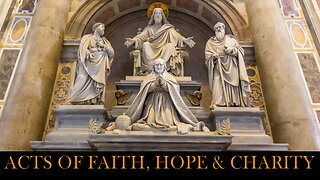Episode 2111: The Power of Prayer, Hope, and Truth
We delve into the timeless wisdom of Catholic saints and their profound insights on prayer, hope, and truth. In this episode, we will explore how these foundational principles from St. Therese of Lisieux and St. John of the Cross resonate with us today, shaping our spiritual journey towards a deeper understanding of God's love and salvation. We'll also reflect on the words of Christ Himself, highlighting the transformative power of truth in our lives.
St. Therese of Lisieux:
"The Creator of the universe awaits the prayer of one poor little person to save a multitude of others, redeemed like her at the price of His Blood." St. Therese beautifully captures the profound impact of prayer, emphasizing the intimate connection between an individual's prayer and the salvation of others. She reveals the profound truth that our prayers, no matter how small we feel they are, can have immense significance in God's plan of redemption. Through prayer, we participate in Christ's redemptive work, becoming instruments of His mercy and love for the world.
This quote from St. Therese of Lisieux encapsulates several key aspects of traditional Catholic spirituality and theology:
Role of Prayer: St. Therese highlights the importance and efficacy of prayer in the Catholic faith. She emphasizes that even though one may feel insignificant or small, the act of prayer has immense power before God. This aligns with Catholic teaching that prayer is a means of communicating with God, and through prayer, God's grace and mercy can be accessed for the benefit of others.
Divine Mercy and Redemption: The reference to Christ redeeming "a multitude of others" at the price of His Blood underscores the foundational Christian belief in the redemptive sacrifice of Jesus Christ on the Cross. According to Catholic theology, Jesus' death and resurrection opened the way to salvation for all humanity. St. Therese highlights that our prayers can be a channel through which this redemptive grace is applied to others.
Communion of Saints: St. Therese's perspective also reflects the Catholic belief in the communion of saints, which includes the living faithful on earth (the Church Militant), the souls in purgatory (the Church Suffering), and the saints in heaven (the Church Triumphant). Catholics believe that the prayers and intercessions of the faithful, including those of "one poor little person," can aid others in their journey towards salvation and spiritual growth.
Personal Relationship with God: St. Therese's emphasis on a personal encounter with God through prayer aligns with the Catholic understanding of spirituality. Catholic tradition emphasizes the importance of developing a personal relationship with God through prayer, which is seen as a way of growing in intimacy and trust with the Divine.
Redemptive Suffering and Offering: St. Therese, known for her "Little Way," also suggests that our prayers, sacrifices, and sufferings can be offered in union with Christ's redemptive sacrifice for the salvation of others. This concept of offering up one's sufferings for the benefit of others is a fundamental aspect of Catholic spirituality.
In summary, St. Therese's quote underscores the profound role of prayer, the redemptive sacrifice of Christ, the communion of saints, and the personal relationship with God in traditional Catholic spirituality. It invites believers to recognize the transformative power of prayer and the potential impact of their spiritual lives on the salvation and well-being of others within the Christian community
Now for St John of the Cross
St. John of the Cross:
"The freshness of a living hope in God fills the soul with such energy and resolution, with such aspirations after the things of eternal life, that all this world seems to it as indeed it is in comparison with that which it hopes for, dry, withered, dead, and worthless..." St. John of the Cross expounds on the transformative power of hope in God. He describes how a soul, filled with hope in eternal life, views the temporal world as insignificant compared to the eternal promises of God. This hope becomes a shield, protecting the soul from worldly distractions and enabling a deeper focus on spiritual growth and salvation.
Now for the complete quote. "The freshness of a living hope in God fills the soul with such energy and resolution, with such aspirations after the things of eternal life, that all this world seems to it as indeed it is in comparison with that which it hopes for, dry, withered, dead, and worthless. The soul now denudes itself of the garments and trappings of the world, by setting the heart upon nothing that is in it, and hoping for nothing that is, or may be, in it, living only in the hope of everlasting life. And, therefore, when the heart is thus lifted up above the world, the world cannot touch it or lay hold of it, nor even see it. The soul then, thus disguised and clad in the vesture of hope, is secure from its second foe, the world, for St. Paul calls hope the helmet of salvation. Now a helmet is armor which protects and covers the whole head, and has no opening except in one place, where the eyes may look through. Hope is such a helmet, for it covers all the senses of the head of the soul in such a way that they cannot be lost in worldly things, and leaves no part of them exposed to the arrows of the world." St. John of the Cross
Here's a breakdown of the key elements:
Living Hope in God: The quote speaks of a hope in God that is dynamic and life-giving. This hope fills the soul with energy and determination. In Catholic theology, hope is one of the theological virtues (alongside faith and charity), pointing towards the expectation of eternal life and salvation through Christ.
Detachment from the World: The quote describes how this living hope in God leads to a profound detachment from worldly pursuits and desires. The soul, focused entirely on the hope of eternal life, sees the attractions of this world as empty and insignificant compared to the promises of God.
Transformation of the Soul: By setting its heart solely on the eternal and spiritual realities, the soul sheds the worldly trappings and becomes impervious to the allure and distractions of the world. This transformation is enabled by hope, which acts as a protective helmet guarding the soul from worldly temptations.
Hope as a Helmet of Salvation: St. Paul's metaphor of hope as a "helmet of salvation" (Ephesians 6:17) is invoked here. A helmet shields the head, which is vital and vulnerable, symbolizing the protection of the soul against the assaults of the world. Hope covers the senses of the soul, preventing them from being ensnared by worldly concerns.
Secured in Hope: The imagery suggests that when the soul is firmly anchored in hope, it becomes invisible and impervious to worldly influences. This invisibility means that the soul is beyond the grasp of worldly enticements, safeguarded by the assurance of eternal life in God.
In summary, St. John of the Cross emphasizes the transformative power of hope in God, which enables the soul to transcend worldly distractions and focus entirely on the promise of eternal life. This hope acts as a shield, protecting the soul from the allure of the world and allowing it to live in anticipation of divine fulfillment. This perspective aligns with the traditional Catholic understanding of the Christian life as a journey towards union with God, anchored in faith, hope, and charity.
John 8:31-32:
"If you remain in my word, you will truly be my disciples, and you will know the truth, and the truth will set you free."Jesus' words underscore the centrality of truth in Christian discipleship. Remaining in His word embracing His teachings and truths leads to authentic discipleship and freedom. The truth of Christ liberates us from sin, falsehood, and spiritual bondage, offering a path to true and lasting freedom in God.
Sure, let's break down this scripture from the Gospel of John, chapter 8, verses 31-32:
Context: In this passage, Jesus is speaking to a group of Jews who had believed in him. He emphasizes the importance of true discipleship and the freedom that comes from knowing and abiding in the truth.
"If you remain in my word": This phrase highlights the necessity of continuing in Jesus' teachings. To "remain" or "abide" in his word means to consistently follow and live according to his teachings. This involves both hearing and obeying what Jesus taught.
"You will truly be my disciples": Jesus connects abiding in his word with true discipleship. A disciple is not merely someone who believes in Jesus, but someone who follows him closely, learning from and imitating him.
"You will know the truth": By remaining in Jesus' word and being his true disciples, believers will come to know the truth. Jesus is referring here to the truth about God, salvation, and the principles of the Kingdom of God that he has been revealing.
"The truth will set you free": This is a profound statement by Jesus. The truth he speaks of is not merely intellectual knowledge but a spiritual reality that brings liberation. Jesus' truth liberates believers from the bondage of sin, ignorance, and falsehood. Knowing and living by Jesus' truth brings freedom from guilt, fear, and the power of sin.
In summary, this scripture emphasizes the transformative power of abiding in Jesus' teachings. True discipleship involves more than just belief; it requires a continual commitment to learning and obeying Jesus' words. As believers grow in this discipleship, they experience the liberating truth of Jesus, which sets them free from the things that hold them captive spiritually.
Conclusion:
As we conclude, we are reminded of the profound impact prayer, hope, and truth have on our spiritual lives. Through the insights of St. Therese of Lisieux and St. John of the Cross, we recognize the significance of prayer as a means of participating in God's saving work and the transformative power of hope that redirects our focus towards eternal truths. Ultimately, the words of Christ Himself beckon us to embrace His truth, leading us to authentic discipleship and the freedom found only in Him. May we embody these principles in our daily lives, drawing closer to God and His eternal promises. Thank you for joining us on this journey of spiritual exploration. Now go out and convert somebody.
-
 15:08
15:08
CatholicReboot
13 days ago $0.05 earnedEpisode 2122: The Heart's Treasure: Cultivating Prayer and Peace - Nightly Episode
149 -
 25:44
25:44
CatholicReboot
10 days agoEpisode 2132: Contemplating Truth
83 -
 1:03:30
1:03:30
UnityLightMinistries
15 days agoTrust in Lord | Seek the Wisdom of the Holy Spirit | Bishop Mar Mari Emmanuel
28 -
 27:33
27:33
Nightring
13 days ago $0.05 earned05-11-2024 - Remember the Sabbath - Romans 10-5 Votd - Salvation is through faith - Show More
412 -
 1:35
1:35
SorrowfulandImmaculateHeartofMaryCoalition
12 days agoActs of Faith, Hope and Charity- Daily Catholic Prayers
4 -
 35:04
35:04
Handinhandwithgodtv
17 days agoPower To Triumph || Exercise Self-Control When You Need To For The Gospel's Sake || May 3, 2024
1 -
 31:56
31:56
Handinhandwithgodtv
20 days agoMentions You @ Power To Triumph || Your Kingdom Assignment Choses Your Lifestyle || May 2, 2024
1 -
 33:27
33:27
Handinhandwithgodtv
21 days agoMentions You @ Power To Triumph || All Areas of Your Kingdom Life Requires Sacrifice || May 1, 2024
1 -
 10:05
10:05
BlessedBeyondBelief8
13 days agoForgive, have no doubt, and your Faith will move mountains.
541 -
 31:50
31:50
The Modern Knights
16 days agoThe Modern Knights Episode 14 God's Law
161